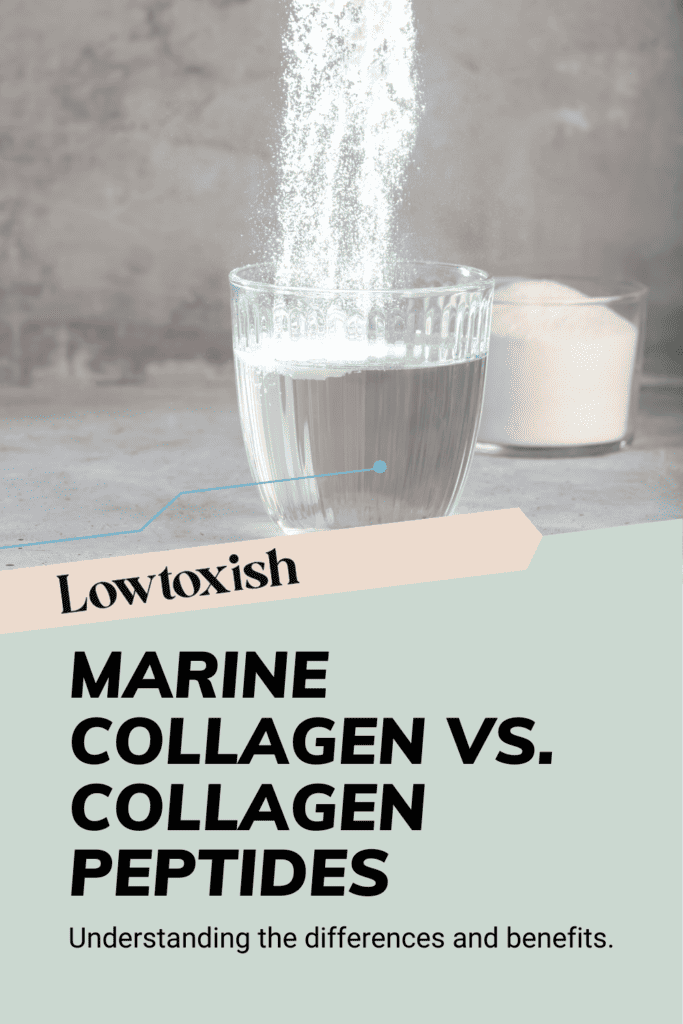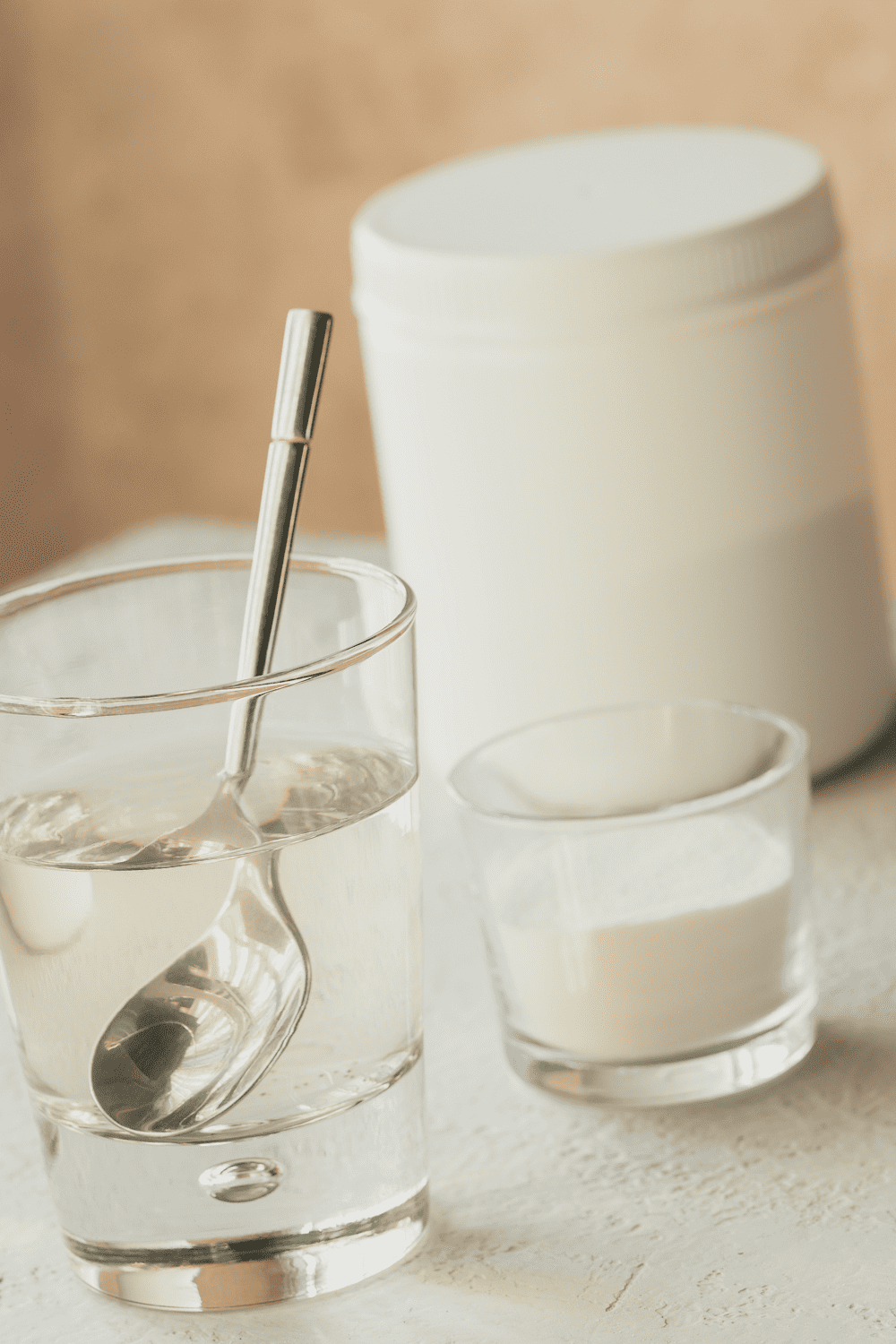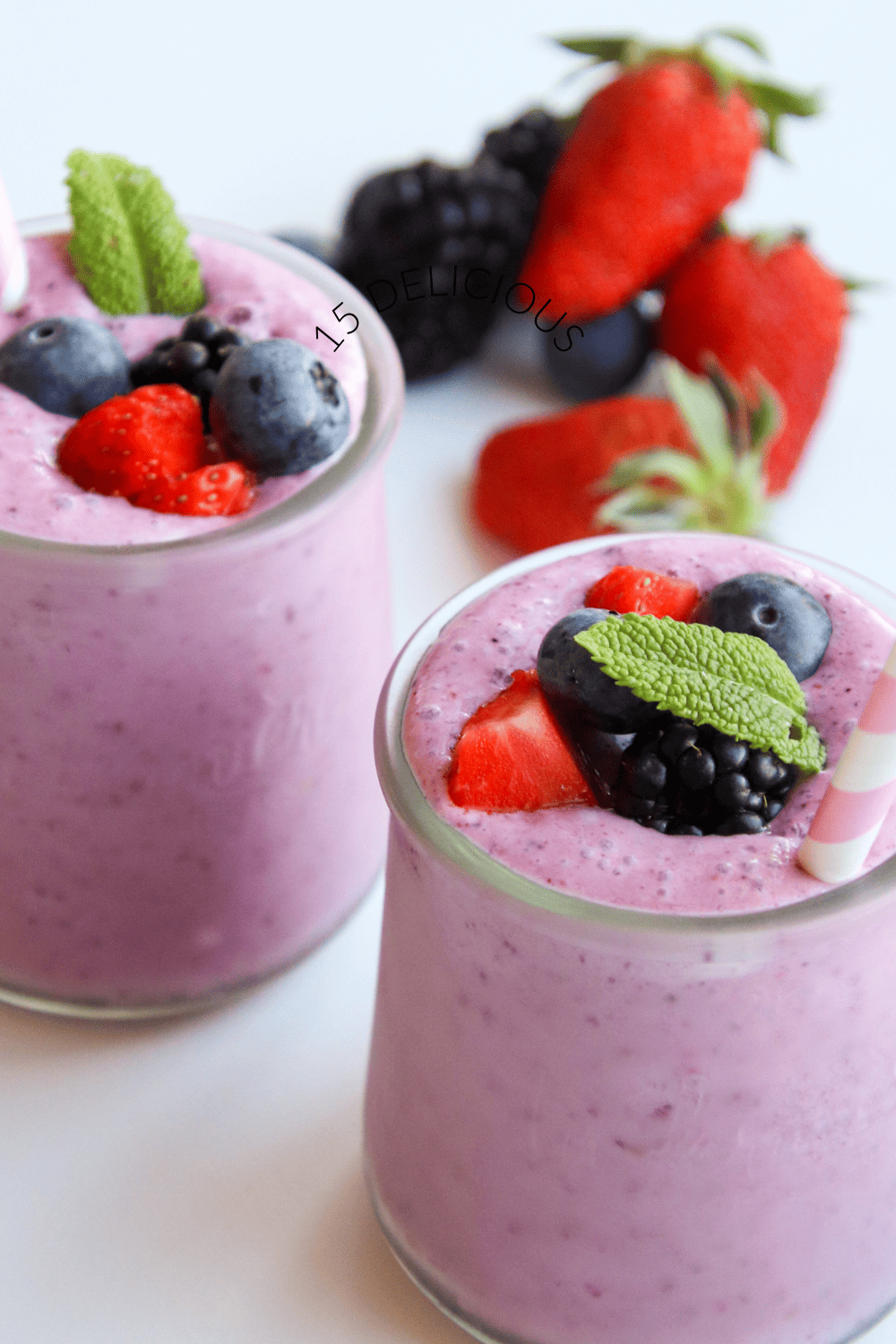Marine Collagen vs. Collagen Peptides: What You Need to Know
This post is about marine collagen vs. collagen peptides.
Welcome to our comprehensive guide comparing marine collagen vs. collagen peptides! If you’re considering adding collagen supplements to your routine, understanding the distinctions between these two options is crucial.
Let’s dive into the details to help you make an informed decision about which one is right for you so you can create a go-to collagen routine.

This post about marine collagen vs. collagen peptides may contain affiliate links, which means I’ll receive a commission if you purchase through my link, at no extra cost to you.
Understanding Marine Collagen vs. Collagen Peptides
Both marine collagen supplements and collagen peptides are sought-after supplements for their health benefits, but they differ notably in their collagen-type composition.
Marine collagen is especially rich in collagen type I, which is the most abundant collagen in the human body, found primarily in our skin, bones, and connective tissues.
This makes marine collagen an excellent choice for enhancing skin hydration and elasticity. On the other hand, collagen peptides can be derived from various sources and typically contain a blend of collagen type I and type III, supporting not only skin health but also hair, nails, and joint health.
Understanding the specific collagen type each supplement provides can help you tailor your choice to your health goals, whether you’re looking to improve skin texture, boost joint mobility, or support overall wellness.
Let’s Clear Something Up…
To be very clear: marine collagen can also be considered collagen peptides. Peptides are simply what makes up collagen and when they are hydrolyzed they are broken down into smaller peptides so they are more digestable.
What most people are wanting to know is what is the difference between collagen peptides derived from marine life sources and collagen peptides derived from bovine sources (you can also source collagen peptides from egg and pig and chicken but bovine/cow is the most common).

Understanding Marine Collagen Sources:
When exploring marine collagen as a supplement, it’s important to recognize its unique sources: fish scales and marine invertebrates.
These components are rich in Type I collagen, the predominant type of collagen in the human body. Sourced from fish scales and the often overlooked marine invertebrates, marine collagen provides a sustainable and potent form of collagen.
This method of sourcing not only contributes to the high bioavailability of marine collagen but also taps into the vast biodiversity of the ocean, offering a broad spectrum of nutritional benefits. By choosing supplements derived from fish scales and marine invertebrates, individuals can support their health while also contributing to more sustainable consumption practices.
Marine Collagen: Sourced from the Sea or Fresh Water
Marine collagen, a highly sought-after form of collagen protein, is predominantly extracted from fish skin.
This collagen source is not only sustainable, utilizing byproducts of the seafood industry, but also rich in collagen type I, the same type that’s abundant in the human body.
Collagen protein plays a crucial role in maintaining the structural integrity of various tissues, including blood vessels, skin, and connective tissues.
By supplementing with marine collagen derived from fish skin, individuals can support the health of their blood vessels and other collagen-rich tissues, promoting overall cardiovascular, skin, and joint health.
The negative of sourcing marine collagen from the sea is that there are many parts of the sea that are polluted and exposed to radioactive waters and/or high mercury levels. Areas that have experienced past nuclear power plant meltdowns, such as areas near Japan would be more likely to have negative elements.
Marine Collagen: Sourced from Farms
Some marine collagen is sourced from fish farms. The positive of this is that you don’t have to worry about radioactive factors or ocean pollution.
The negative is that fish farms sometimes have unclean waters where the fish are swimming in their own feces and they are likely fed fish feed as opposed to all of the full spectrum live food they would find in the wild. They also could be fed antibiotics or exposed to more chemicals since their environment is more controlled and “fake.”
Collagen Peptides from Land Animals:
Collagen peptides, on the other hand, are derived from various sources, including bovine (cow), porcine (pig), or even marine animals. They undergo a process called hydrolysis, which breaks down the collagen into a smaller smaller particle size, making it easier for our bodies to digest and absorb. Collagen peptides typically contain a mix of Type I and Type III collagen, offering benefits for skin, hair, nails, and joint health. They are versatile and can be added to a variety of recipes, from smoothies and soups to baked goods and beverages.
Choosing Between Marine Collagen and Collagen Peptides:
The key difference between marine collagen and collagen peptides lies in their source and collagen type. Marine collagen, sourced from fish, primarily offers type I collagen, renowned for skin health benefits due to its high bioavailability.
Collagen peptides, produced through hydrolysis from various sources, provide a mix of collagen types, including type I and III, making them versatile for broader health benefits, such as enhancing joint mobility and gut health. This key difference highlights the importance of choosing based on your health goals and dietary needs.
The Impact of Aging on Collagen Production
As we age, our bodies naturally begin to produce less collagen, leading to visible signs of aging such as wrinkles, decreased skin elasticity, and joint pain.
This reduction in collagen production is a natural part of the aging process, making it increasingly important to seek external sources of collagen to supplement the diminishing internal supply.
Understanding this decline and recognizing the benefits of marine collagen and collagen peptides can help individuals make informed decisions about incorporating these supplements into their health regimen.
By addressing the issue of less collagen, we can take proactive steps towards maintaining our skin’s youthfulness, joint health, and overall vitality.
Understanding Type 1 and Type 3 Collagen
If you’re going to understand the differences between marine collagen and collagen peptides from bovine (or other sources then it’s important to understand the difference between type 1 and type 3 collagen.
Type I Collagen
- Key Benefits: Essential for the health of skin, bones, teeth, and connective tissues.
- Prevalence: This is the predominant type of collagen within the human body.
- Source Recommendations: Supplements derived from marine sources, specifically fish, are abundant in Type I collagen. This variant is favored for enhancing skin health because of its high absorbability, which can significantly boost skin’s elasticity, moisture levels, and overall look. Beyond skin benefits, it plays a crucial role in reinforcing the strength of nails, hair, and the structural integrity of bones.
Type III Collagen
- Key Benefits: Vital for the maintenance and structure of muscles, internal organs, and arterial walls.
- Function in the Body: Present alongside Type I collagen in the dermis, Type III collagen aids in sustaining skin’s resilience and tightness. Moreover, it is instrumental in cardiovascular wellness through its support of blood vessel structural health.
- Source Recommendations: Collagen supplements sourced from bovine (beef) typically include a mix of Type I and III collagen, mirroring the natural composition found in bovine tissues.
Benefits of Marine Collagen: Mostly Type 1 Collagen
Marine collagen mainly contains type 1 collagen, which is the most abundant form of collagen in the body.
Marine collagen, particularly in the form of marine collagen peptides, is renowned for its ability to promote healthy, youthful-looking skin.
Extracted from the skin and scales of fish, marine collagen peptides contain primarily Type I collagen, making them an excellent option for supporting skin elasticity, joint health, and overall collagen production in the body.
Furthermore, the bioavailability of marine collagen peptides ensures that they are efficiently absorbed and utilized by the body, maximizing their health benefits.
Benefits of Collagen Peptides Blends: Type 1 & 3 Collagen
The great benefit of collagen peptides (usually derived from cow, pig, or chicken- but mainly cow) is that they contain both Type 1 and Type 3 collagen so you get all of the benefits as marine collagen but also the added benefits of type 3 collagen.
Of course, there will be nuanced differences even in type 1 collagen from marine sources and type 1 collagen from non-marine sources.
Marine Collagen vs. Collagen Peptides: Which One is Right for You?
Choosing between marine collagen and collagen peptides depends on various factors, including your health goals, dietary preferences, dietary requirements, and lifestyle. Consider the source, absorption rate, and potential allergens when making your decision.
Additionally, consult with a healthcare professional to determine the best option for your individual needs.
To clarify, marine collagen can still have type 3 collagen in it, it is just mostly type 1 collagen.
Tailoring to Your Health Objectives:
- If your aim is to enhance the health of your skin, minimize the appearance of fine lines, and boost skin firmness, opting for Type I collagen is advisable. Its significant presence in the skin makes it the go-to choice for these purposes.
- To bolster the health of your muscles and cardiovascular system, selecting a supplement that offers Type III collagen, alongside Type I, could offer added benefits. This is because of its crucial role in muscular and vascular structures.
Navigating Dietary Needs and Sensitivities:
- For those steering clear of beef-derived products, marine-sourced collagen, abundant in Type I, presents a viable alternative. However, it’s worth noting that this may not be suitable for those with allergies to fish.
- Bovine-sourced collagen supplements, which typically feature a blend of Type I and Type III collagen, cater to individuals looking for non-marine options.
Understanding Absorption and Effectiveness:
- Known for its superior absorbability, marine collagen, primarily featuring Type I, is often viewed as potentially more efficacious, especially when targeting skin health enhancements.
While many collagen supplements offer a combination of Type I and Type III collagen, addressing a wide spectrum of health benefits, tailoring your choice to your specific health goals is key.
Health Goals
Evaluate your specific health goals and what benefits you hope to achieve from collagen supplementation.
For example, if you’re primarily looking to improve skin elasticity and hydration, marine collagen may be the preferred choice due to its renowned beauty benefits.
On the other hand, if you’re seeking overall joint support, muscle recovery, or gut health improvements, collagen peptides with a blend of collagen types may be more suitable.
Dietary Preferences
Take into account your dietary preferences, restrictions, and ethical considerations. Marine collagen, sourced from fish, is an excellent option for pescatarians or those following a seafood-based diet.
Meanwhile, collagen peptides derived from various animal sources, such as bovine collagen peptides or porcine collagen, offer a broader range of options to accommodate different dietary lifestyles.
It’s also important to consider the amount of protein per serving if you have a goal of increasing protein intake. Bovine-sourced collagen often has a higher protein content.
Lifestyle Factors
Consider how collagen supplementation fits into your daily routine and lifestyle. Evaluate the convenience of incorporating marine collagen or collagen peptides into your meals or beverages.
Additionally, assess the ease of sourcing and availability based on your location and accessibility to different collagen products.
Potential Allergens
Be mindful of potential allergens associated with marine collagen and collagen peptides. While marine collagen is derived from fish, collagen peptides may contain allergens from various animal sources, such as bovine or porcine. Assess your tolerance to specific collagen sources and any potential allergens to avoid adverse reactions.
Transparency in Testing
Based on my research there is more transparency as far as testing and making sure the collagen is free of heavy metals and other chemicals with bovine-sourced collagen peptides.
I could not find a lot of marine collagen options that had shared lab testing results.
Bovine Collagen Peptide Supplements To Try
Promix Grass-Fed Hydrolyzed Collagen Peptides Powder

- Transparent testing results: tested very very low for all heavy metals.
- 1 serving= 20 g protein
- Price Breakdown: $1.17/serving AND .65/10g of protein
- Hydrolyzed type 1 & 3 collagen
- From grass-fed Brazillian cows
- This company makes a lot of very clean interesting products.
- Use the code “lowtoxish” at checkout for 20% off $50 or more.
- There is a really cool protein calculator on their site that tells you how much protein you should aim for a day and how much is ok from supplements.
Zint Collagen Peptides Powder

- 3rd Party Tested Totally Free from: lead, mercury, cadmium, and arsenic.
- Price Breakdown: .63/scoop AND .58/10 g of protein
- 1 Scoop= 11g protein
- Grass Fed
- Non GMO
- Collagen 1 & 3
- Hormone Free
- 4.5 out of 5 star reviews
- Hydrolyzed collagen
Marine Collagen Supplements To Try
Sports Research Marine Collagen Peptides Powder

- 9 grams of protein per scoop
- $1.02/10 g of protein
- .92 per serving
- Collagen type 1 & 3
- 3rd party tested
- Non-GMO tested
- cGMP Compliant
Codeage Marine Collagen Powder – Wild-Caught

- .98 per serving
- $1.08 per 10g of protein
- 9g of protein per serving
- Non-GMO
- Wild caught
- Collagen types 1 & 3
Marine Collagen vs. Collagen Peptides: Conclusion
In conclusion, the choice between marine collagen and collagen peptides ultimately depends on your individual preferences and priorities.
Whether you prioritize sustainability, absorption, or versatility, both options offer valuable benefits for enhancing skin, joints, and overall health.
By understanding their differences and considering your unique needs, you can make an informed decision that supports your well-being journey.
For me personally it comes down to:
- Transparent testing and clear labs (no heavy metals), ideally organic or wild caught.
- Higher protein levels.
This post is about marine collagen vs. collagen peptides.
More posts like this…
- Collagen: Hydrolyzed vs. Peptides : What’s The Difference?
- Liquid Collagen vs Powder Collagen: The Ultimate Guide
- 10 Amazing AIP Breakfast Smoothies to Try Using AIP Safe Protein Powders
Favorite Health Posts
Favorite Posts
Favorite Health Posts
Last update on 2024-07-23 / Affiliate links / Images from Amazon Product Advertising API
This product presentation was made with AAWP plugin.



















